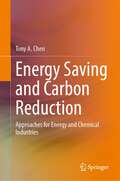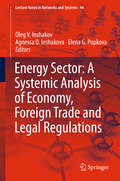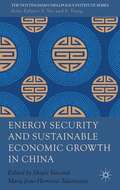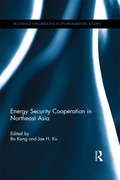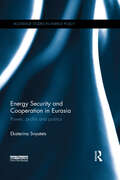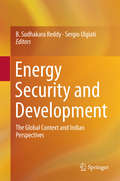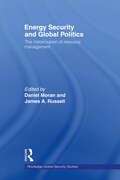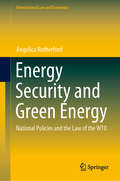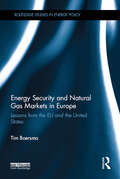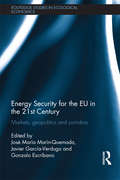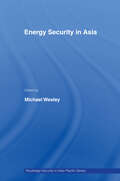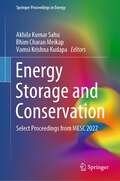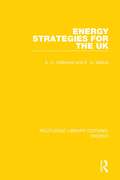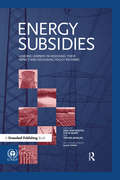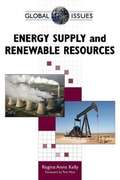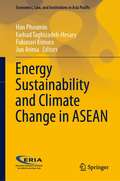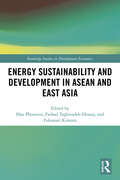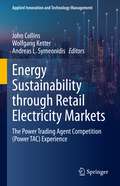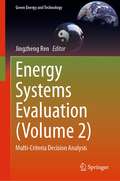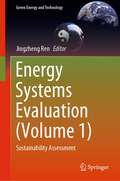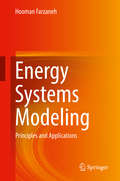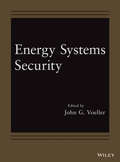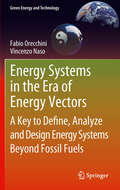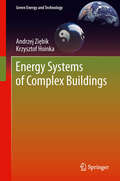- Table View
- List View
Energy Saving and Carbon Reduction: Approaches for Energy and Chemical Industries
by Tony A. ChenThe book provides an integrated energy/exergy analysis method to identify the energy utilization issues and systematically propose the cost-effective energy-saving and CO2 mitigation/capture solution. There is a strong market needs on energy-saving and greenhouse gas (GHG) reduction. CO2 mitigation/capture will achieve economic benefit of fuel, power, and carbon tax saving as well as environmental GHG reduction. The book is a professional book for energy-saving and GHG gas mitigation technology in oil & gas, oil refining, and chemical industry. It is an integrated technical book that combines energy utilization theory and practical method, including: thermodynamic analysis for unit operation and process units; energy and exergy calculation for various process streams and utilities; three-link energy/exergy analysis model; energy/exergy balance of equipment, process units, and entire plant; approach and technology of energy saving; optimization of pipeline and equipment; pinch energy-saving technology and its application; CO2 capture and utilization with 8 case studies incorporated for all different scenarios; key energy-saving technologies such gas turbine, FCCU regeneration CO combustion and energy recovery, flue gas turbine system optimization, low-grade heat recovery and utilization. The book is intended for engineers and professional personnel who are working in process engineering, EPC companies, chemical and petrochemical plants, refineries, oil & gas production facilities, power generation plant. It can also be a professional reference or textbook for undergraduate or graduate-level university students and teaching personnel of chemical, energy, and process engineering faculties of universities.
Energy Sector: A Systemic Analysis of Economy, Foreign Trade and Legal Regulations (Lecture Notes in Networks and Systems #44)
by Elena G. Popkova Oleg V. Inshakov Agnessa O. InshakovaThis book is a comprehensive economic and legal study of the theoretical and practical aspects of the problems of increasing energy efficiency; self-motivation of energy saving by business entities within the framework of their corporate responsibility; regulatory mechanisms to stimulate energy conservation in the economy; civil-law regulation of foreign trade turnover of energy resources between economic entities of the Russian Federation and companies of member states of international integration associations – the CIS, EEMP, the EU and BRICS. It argues that technological energy saving plays a key role in reducing the energy intensity and increasing the energy efficiency of the economy, and substantiates the need for institutional support – including legal support for the participation of the Russian Federation – in various forms of international cooperation. Lastly, based on an analysis of current legislation, programs and recommendations, judicial and contractual practices, customs and trade procedures, it offers proposals for the developing, improving and unifying civil law regulation of obligations in the sphere of international trade in energy resources, as well as methodological recommendations for drafting foreign trade contracts in the energy sector.
Energy Security And Sustainable Economic Growth In China
by Shujie Yao Maria Jesus HerreriasThis book focuses on various issues of energy, energy efficiency and environmental policy in China. It discusses different aspects on how China may maintain its fast economic growth through good management of energy consumption and development of various energy sources.
Energy Security Cooperation in Northeast Asia (Routledge Explorations in Environmental Studies)
by Jae H. Ku Bo KongDrawing on cutting-edge research from leading scholars, this book investigates state preferences for regime creation and assesses state capacity for executing these preferences in Northeast Asia’s energy domain, defined as the geographical area comprising the following countries: Russia, Mongolia, China, Japan, South Korea and North Korea. It examines questions pertaining to how states perceive the need and necessity for establishing a regime when it comes to the issue of energy and how much commitment they make to the effort in Northeast Asia. The book analyses the factors that shape each country’s fundamental energy interests in the region, how these interests impact their attitudes toward engaging the region on energy security and the way they carry out their regional engagement. Based on countries’ interests in promoting institutionalized regional energy cooperation and their capacity for forging that cooperation, the collection assesses each state’s role in contributing to an energy regime in Northeast Asia. It then concludes with a critique on the decade-plus quest for energy security cooperation in Northeast Asia and suggests ways forward for facilitating regional energy security cooperation. This book will be of great interest to scholars and students of environmental policy, energy policy, security studies, Asian studies and international relations.
Energy Security and Cooperation in Eurasia: Power, profits and politics (Routledge Studies in Energy Policy)
by Ekaterina SvyatetsWhy are bilateral relations, especially in the area of energy security, so different in the cases of U.S.-Russia, U.S.-Azerbaijan, and Russia-Germany energy deals? Why do some states find common ground despite differences, while others, with all the seemingly favourable conditions, are sinking into animosity? Energy Security and Cooperation in Eurasia explores varying outcomes of energy cooperation, defined as diplomatic relations, bilateral trade, and investment in oil and natural gas. The book looks at economic potential, geopolitical rivalry, and domestic interest groups in the cases of U.S.-Russia, U.S.-Azerbaijan, and Russia-Germany energy ties. It looks at major projects in each case (Sakhalin and Arctic oil and gas production, Baku-Tbilisi-Ceyhan and Nord Stream pipelines) and activities of international oil companies. The book also provides a detailed analysis of the situation in Ukraine since 2014 and Russia’s annexation of Crimea, and their effect on European energy security. This book utilizes an innovative approach of exploring the dyads of states (bilateral relations) along the economic, geopolitical, and domestic lobbying dimensions. This book is a valuable resource for graduate and undergraduate students, academics and researchers in the areas of Security, Political Economy, Comparative Politics, post-Soviet studies, as well as for general public.
Energy Security and Development
by B. Sudhakara Reddy Sergio UlgiatiThis volume provides a systematic framework for energy suppliers, policy makers, academics, students, and all others interested in energy security, and analyzes key issues concerning energy, security and sustainability with the help of a wealth of data. While sustainability is the broadest objective, energy security is an important part of it, at the global, national and societal levels. The development of a sustainable, long-term solution to meeting the world's energy needs is a defining issue of our time, since central global challenges that the world faces--poverty alleviation, climate change, and environmental degradation--are directly linked to energy security. The contributions cover key issues in sustainable energy and illustrate that the insecurity of a majority of countries owes to internal factors which have more to do with market forces, inefficient technologies, lack of institutions, environmental insecurity, pricing mechanisms, etc. , and less to do with the international situation. The links between energy and development are both direct and indirect. Directly, energy provides several services and utilities to maintain human well-being, and also does so indirectly through stakeholders. This volume addresses both the direct and indirect links and provides sustainable alternatives, helping readers to better grasp the resilience of both socio-economic and resource sub-systems in the process. The issues affecting energy supply and demand, including technology portfolios, environmental considerations and consumer attitudes are thoroughly discussed. One of the critical questions that arises is how to facilitate energy investment. The investment climate and the key issues involved are analyzed, including: the capital flows with reasonable and stable investment frameworks, timely decision-making by governments, and open markets. The broad objective of the volume is to foster a deeper understanding of the concept of energy security and to identify the methods of analysis, policy initiatives and future research needed to generate a balanced pattern of energy use and mitigate its impact on humanity and the environment.
Energy Security and Global Politics: The Militarization of Resource Management (Routledge Global Security Studies)
by James A. Russell Daniel MoranThis book analyses the strategic dimensions of energy security, particularly where energy resources have become the object of military competition. The volume explores the risks that may arise from conditions of increasing economic competition and resource scarcity, and the problems that may follow if major producers or consumers of energy lose con
Energy Security and Green Energy: National Policies and the Law of the WTO (International Law and Economics)
by Angelica RutherfordThis book shows how the links between energy security and national and international law and policies on green energy pose challenges to a transition towards a green energy system. Based on empirical work carried out in two very different country case studies – Great Britain and Brazil – this book attempts to foster a better understanding of the role played by energy security in constructing and deconstructing green energy policy initiatives. The broad range of views raised in national contexts leads to legal disputes in international forums when attempts are made to address the issues of this energy security/green energy interplay. As such, building on the findings of the case studies, this book then analyses the interplay between energy security and green energy development in international trade law as encapsulated in the law of the World Trade Organisation (WTO). Finally, the author proposes a way forward in creating the legal space in the law of the WTO for trade restrictive measures aimed at ensuring green energy security.
Energy Security and Natural Gas Markets in Europe: Lessons from the EU and the United States (Routledge Studies in Energy Policy)
by Tim BoersmaMoving beyond most conventional thinking about energy security in Europe which revolves around stability of supplies and the reliability of suppliers, this book presents the history of European policy-making regarding energy resources, including recent controversies about shale gas and fracking. Using the United States as a benchmark, the author tests the hypothesis that EU energy security is at risk primarily because of a lack of market integration and cooperation between member states. This lack of integration still prohibits natural gas to flow freely throughout the continent, which makes parts of Europe vulnerable in case of supply disruptions. The book demonstrates that the EU gas market has been developing at different speeds, leaving the Northwest of the continent reasonably well integrated, with sufficient trade and liquidity and different supplies, whereas other parts are less developed. In these parts of Europe there is a structural lack of investments in infrastructure, interconnectors, reverse flow options and storage facilities. Thus, even though substantial progress has been made in parts of the EU, single source dependency often prevails, leaving the relevant member states vulnerable to market power abuse. Detailed comparisons are made of the situations in the Netherlands and Poland, and of energy policy in the USA. The book dismantles some of the existing assumptions about the concept of energy security, and touches upon the level of rhetoric that features in most energy security and policy debates in Europe.
Energy Security for the EU in the 21st Century: Markets, Geopolitics and Corridors (Routledge Studies In Ecological Economics Ser.)
by Gonzalo EscribanoRecent developments like the rising trend in crude oil price, the international economic crisis, the civil revolts in Northern Africa and the Middle East, the nuclear threat in Japan after the tsunami, the oil spill in the Gulf of Mexico and the economic growth of emerging countries like China and India have a direct relation to the security of energy supply anywhere in the world. This book provides a comprehensive analysis of energy risks, energy scenarios and energy policies with special reference to the European Union and its member states, emphasizing the economic and geopolitical dimensions of energy security. The book assesses both quantitatively and qualitatively the socioeconomic and political risks related to the European energy supply, together with the EU’s energy relations with other countries. Two innovative indicators have been developed to estimate geopolitical energy risks and energy-related relations with other countries. The book also examines the process of convergence of member states’ energy security policies, the path towards a common European energy policy, and the process of Europeanization projected towards the energy corridors through which the EU receive energy imports. In addition, alternative strategic scenarios related to energy risk are assessed. Finally, guidelines for the EU’s energy policy and new strategies using energy corridors are suggested in order to maximize EU’s energy security. The book should be of interest to students and researchers across a wide range of subjects, including energy economics and policy, energy and foreign policy in the EU, energy policies in EU member states and several aspects related to international political economy.
Energy Security in Asia (Routledge Security in Asia Pacific Series)
by Michael WesleyThis book explores the various dimensions of energy security in Asia – which has become an increasingly important geopolitical issue. Reputable international contributors look at the roles played by each of the major energy importers: the United States, China, Japan and India, as well as the main suppliers: the OPEC states, Russia, the Central Asian states and Australia. In each case, the domestic politics of energy security are investigated, and state interests and perspectives on the issue are considered. Analyzing the policy and security aspects of energy security, the book includes an examination of: the geopolitics of energy competition strategic, economic and environmental dimensions the impacts of energy security on human security. With energy security being one of the central issues facing the world today, this book is a timely and impressive appraisal of the major energy security issues facing Asia.
Energy Security: Policy Challenges and Solutions for Resource Efficiency
by Nikolai Mouraviev Anastasia KoulouriThis book discusses energy policy within the framework of the expansion of renewable energy sources (RES) and increasing resource use efficiency. In this book, the term ‘resource efficiency’ is defined as deriving the most value from resource inputs related to energy production, while incorporating energy efficiency. The authors highlight the drivers, policy approaches, governance issues and management problems related to the reduction of dependency on fossil fuels by focusing on RES and resource efficiency. Mouraviev and Koulori argue that enhancing energy security requires a new approach, integrating two core components: the emphasis on increasing energy production from renewable sources and resource use efficiency, which forms a contrast to the traditional understanding of energy security as security of supply. Blending theory with practice using several case studies, this original book provides a novel conceptualisation of energy security that will be of interest and value to practitioners and policy makers as well as scholars and researchers.
Energy Storage and Conservation: Select Proceedings from MESC 2022 (Springer Proceedings in Energy)
by Bhim Charan Meikap Akhila Kumar Sahu Vamsi Krishna KudapaThis volume comprises the select proceedings of the International Conference on Materials for Energy Storage and Conservation (MESC 2022). It aims to provide a comprehensive spectrum picture of the state-of-the-art research and development in diverse areas such as energy conservation, chemical energy storage, electrical and electromagnetic energy storage, energy management, biological energy storage, nanotechnology for renewable energy, solar cell materials, thermal energy storage, energy storage risk analysis, environment and health effects of energy efficiency, among others. This volume will be of interest to researchers, academicians, professionals, policymakers, scientists, and members of the industry working in the field of energy storage and conservation.
Energy Strategies for the UK (Routledge Library Editions: Energy)
by Stephen Littlechild Kirit VaidyaOriginally published in 1982. This book describes a comprehensive and integrated model of the UK energy sector which focuses on decision-making and optimisation rather than on forecasting or simulation. It incorporates the production and investment policy of all the major fuels over a fifty-year horizon and analyses strategy under a variety of different assumptions about costs, demands, technology and future decisions. The chapters cover a wide spectrum of energy problems and policy, including scenarios of rising oil and gas prices, and there are striking calculations of the costs of a non-nuclear plus conservation strategy. Interesting reading for those concerned with energy policy.
Energy Subsidies: Lessons Learned in Assessing their Impact and Designing Policy Reforms
by Anja Von Moltke Klaus Töpfer Colin McKee Trevor MorganThe need to reform energy subsidies was one of the pressing issues highlighted at the World Summit on Sustainable Development. Many types of subsidy, especially those that encourage the production and use of fossil fuel, and other non-renewable forms of energy, are harmful to the environment. They can also have high financial and economic costs, and often only bring few benefits to the people for whom they are intended.Removing, reducing or restructuring such energy subsidies is helpful for the environment and the economy at the same time. Potential social costs in terms of employment in the conventional energy industry or reduced access to energy could be addressed by redirecting the money formerly spent on subsidies to income support, health, environment, education or regional development programmes.Of course, subsidies can have certain positive consequences, particularly where they are aimed at encouraging more sustainable energy production and use. Temporary support for renewable energy and energy-efficient technologies to overcome market barriers, and measures to improve poor or rural households' access to modern, commercial forms of energy, for instance, could be positive measures in support of sustainable development.Based on ground-breaking work undertaken by UNEP and the International Energy Agency, this book aims to raise awareness of the actual and potential impacts of energy subsidies and provide guidance to policy-makers on how to design and implement energy-subsidy reforms. It provides methodologies for analysing the impact of subsidies and their reform, and reviews experiences with energy subsidies in a number of countries and regions. Drawing on these case studies, it analyses the lessons learned as well as the policy implications, and provides guidance on how to overcome resistance to reform.The book provides an analytical framework which aims to set the scene for the detailed discussion of energy-subsidy issues at the country level. It considers how subsidies are defined, how they can be measured, how big they are and how their effects can be assessed. A more detailed discussion of methodological approaches to the assessment of the economic, environmental and social effects of subsidies and their reform is contained in the Annex.Chapters 3–11 of the book contain country case studies from contributing authors, which review various experiences and issues related to energy subsidies in selected countries, but do not strive for a common approach. They are organised along geographical lines, beginning with a review of energy subsidies generally in OECD countries. Case studies of energy subsidies in transition economies – the Czech and Slovak Republics (Chapter 4) and Russia (Chapter 5) – follow. Three studies of Asian countries focus on the costs of different types of energy subsidy: electricity subsidies in India (Chapter 6), oil subsidies in Indonesia (Chapter 7) and energy subsidies generally in Korea (Chapter 8). Chapter 9 reviews the effect of energy subsidies in Iran and suggests a pragmatic approach to reforming them. This is followed by an assessment of the LPG subsidy programme in Senegal (Chapter 10) and an analysis of the effects of removing coal and oil subsides in Chile (Chapter 11).Chapter 12 analyses the lessons learned from these case studies, focusing on the economic, environmental and social effects and their implications for policy. Finally, Chapter 13 discusses the implications of these findings and makes practical recommendations for designing and implementing policy reforms.This book will be essential for both practitioners and academics involved in the energy sector and for governments and policy-makers wishing to examine the reform of energy subsidies.
Energy Supply and Renewable Resources
by Regina Anne KellyThis reference is designed to be a first-stop resource for high school and undergraduate students. It surveys current energy production and consumption trends and controversies, and draws parallels between the energy challenges faced by the US and several other nations. As with other volumes in the series, the book contains three sections, with an introduction to national and global issues followed by excerpts and full texts of US and international primary source documents. The third section provides research tools, including brief biographies, statistical data, an annotated bibliography, and detailed guidance on researching global energy issues online and in libraries. A chronology and a glossary are also included. Kelly has written on energy for scientific and trade journals. Annotation ©2007 Book News, Inc., Portland, OR (booknews.com)
Energy Sustainability and Climate Change in ASEAN (Economics, Law, and Institutions in Asia Pacific)
by Farhad Taghizadeh-Hesary Fukunari Kimura Han Phoumin Jun ArimaThis book provides several up-to-date empirical policy-oriented studies on assessing the impacts of climate change on various economic sectors and the role of renewable energy resources in mitigating pollution and climate change. It suggests various policy recommendations on how to increase the share of renewable energy resources in the energy baskets of the members of the Association of Southeast Asian Nations (ASEAN) and the rest of the world to ensure energy sustainability. As of 2020, most of the world’s energy investment still went to carbon-emitting sources, namely, fossil fuels. On the other hand, the Covid-19 pandemic and the economic Project Overview 20 March 2021 08:39 Page 6 of 9 downturns shrank the global energy demand, including fossil fuels, resulting in a sharp drop in their prices. Low fossil fuel prices are harmful to developing renewable energy projects, making solar, wind, and other renewable energy resources less competitive as sources of electricity. This is endangering the Paris agreement and the “Climate Action” goal of the United Nations. Given the high share of fossil fuels in the energy mix of the members of ASEAN, tremendous challenges must be faced for their energy transition in the post-Covid-19 world. The authors call for sound policy and applicable technologies to ensure sustainable energy availability, accessibility, and affordability to reach emission reduction targets.
Energy Sustainability and Development in ASEAN and East Asia (Routledge Studies in Development Economics)
by Farhad Taghizadeh-Hesary Fukunari Kimura Phoumin HanThe rapid and sustained economic growth of the past two decades has led to marked increases in energy demand in the region and developing Asia will continue to lead the energy demand growth. The increase in energy demand threatens energy security and efforts to curb carbon dioxide emissions, affecting health and social well-being. These common energy challenges will need to be addressed through concerted efforts. This book provides several multi-dimensional quantitative analysis of the relationship between energy and other subjects including but not limited to income and economic growth, environment and health, food and agricultural production. The book also provides the most constructive policy recommendations concerning the relationship between energy, economic development, social development, and environmental development.
Energy Sustainability through Retail Electricity Markets: The Power Trading Agent Competition (Power TAC) Experience (Applied Innovation and Technology Management)
by John Collins Andreas L. Symeonidis Wolfgang KetterThe world is moving away from demand-driven electricity markets supplied by centralized generation and distribution of fossil-fuel-produced electricity. Increasing reliance on weather-dependent renewable sources will require a shift toward a supply-driven paradigm, while beneficial electrification, including widespread adoption of electric vehicles, heat pumps, and batteries will offer considerable but widely distributed demand flexibility that can be used to compensate for supply variability. The open-source Power Trading Agent Competition (Power TAC) platform simulates a decentralized future, modeling the high complexity of future retail electricity markets. This book describes a variety of approaches to profitable trading in realistic wholesale and retail electricity markets. It presents actionable insights from extensive exploration of policies and business models for retail electricity markets gained from a decade of Power TAC tournaments, and from research inspired by the Power TAC experience. Featuring contributions from tournament designers, competitors, and scientists combining best practices from computer science and economics and management science, this book is of benefit to academics, researchers, practitioners and policy makers in sustainable energy and wholesale and retail electricity markets.
Energy Systems Evaluation: Multi-Criteria Decision Analysis (Green Energy and Technology)
by Jingzheng RenThis book presents various multi-criteria analysis methods for sustainability-oriented analysis and decision-making for energy systems, under various different conditions and scenarios. It presents methodologies to answer the questions relating to which of the options are the most sustainable among the alternatives, and how multi-criteria decision analysis methods can be used to select the most sustainable energy systems. A systematic innovative methodological framework is presented, which enables the most appropriate energy system to be selected under different conditions including: Scientific decision support tools for sustainable energy system selection; Fuzzy, grey, and rough sets based multi-criteria decision analysis; Decision-making models under uncertainties; and The combination of life cycle thinking and multi-criteria decision analysis This book is of interest to researchers, engineers, decision makers, and postgraduate students within the field of energy systems, sustainability, and multi-criteria decision analysis.
Energy Systems Evaluation: Sustainability Assessment (Green Energy and Technology)
by Jingzheng RenThis book presents various methods for sustainability assessment of energy systems, under various different conditions and scenarios. It answers the questions of how to measure the sustainability of energy systems by adopting appropriate metrics and methods. This book provides readers with a comprehensive view of the frontiers of sustainability assessment methods for energy system analysis. It presents various methodologies, allowing readers to understand: the complete metrics for sustainability assessment; life cycle thinking for sustainability assessment of energy systems; and the advanced sustainability assessment methods for energy systems. This book is of interest to researchers, engineers, decision makers, and postgraduate students within the field of energy systems, sustainability, and decision analysis.
Energy Systems Modeling: Principles and Applications
by Hooman FarzanehThis book serves as an introductory reference guide for those studying the application of models in energy systems. The book opens with a taxonomy of energy models and treatment of descriptive and analytical models, providing the reader with a foundation of the basic principles underlying the energy models and positioning these principles in the context of energy system studies. In turn, the book provides valuable insights into the varied applications of different energy models to answer complex questions, including those concerning specific aspects of energy policy measures dealing with issues of supply and demand. Case studies are provided in all of the chapters, offering real-world examples of how existing models fit the classification methods outlined here. The book’s remaining chapters address a broad range of principles and applications, taking the reader from the basic principles involved, to state-of-the-art energy production and consumption processes, using modeling and validation/illustration in case studies to do so. With its in-depth mathematical foundation, this book serves as a comprehensive collection of work on modeling energy systems and processes, taking inexperienced graduate students from the basics through to a high-level understanding of the modeling processes in question, while also providing professionals and academic researchers in the field of energy planning with an up-to-date reference guide covering the latest works.
Energy Systems Security
by John G. VoellerEnergy Systems Security features articles from the Wiley Handbook of Science and Technology for Homeland Security covering topics related to electricity transmission grids and their protection, risk assessment of energy systems, analysis of interdependent energy networks. Methods to manage electricity transmission disturbances so as to avoid blackouts are discussed, and self-healing energy system and a nano-enabled power source are presented.
Energy Systems in the Era of Energy Vectors
by Vincenzo Naso Fabio OrecchiniWhat lies beyond the era of fossil fuels? While most answers focus on different primary energy resources, Energy Systems in the Era of Energy Vectors provides a completely new approach. Instead of providing a traditional consumption analysis of classical primary energy resources such as oil, coal, nuclear power and gas, Energy Systems in the Era of Energy Vectors describes and assesses energy technologies, markets and future strategies, focusing on their capacity to produce, exchange, and use energy vectors. Special attention is given to the renewable energy resources available in different areas of the world and made exploitable by the integration of energy vectors in the global energy system. Clear definitions of energy vectors and energy systems are used as the basis for a complete explanation and assessment of up-to-date, available technologies for energy resources, transport and storage systems, conversion and use. The energy vectors scheme allows the potential realization of a worldwide sustainable energy system to fulfill global development expectations by minimizing both the impact on the environment, and the international political frictions for access to limited and concentrated resources. Energy Systems in the Era of Energy Vectors is an informative read for researchers and advanced students in industrial, energy and environmental engineering. It also contains valuable information for managers and technicians working in the energy sector.
Energy Systems of Complex Buildings
by Andrzej Ziębik Krzysztof HoinkaThe production and consumption of energy carriers in complex buildings take place within the network of interconnected energy processes. For this reason, a change carried out in one energy process influences other energy processes. Therefore, all balance equations of energy carriers should be investigated as a whole, and energy management of complex buildings creates a large energy system with internal relationships between energy installations and the equipment, as well as external relationships with the environment. Energy Systems of Complex Buildings presents the system approach to the energy-ecological analysis of energy management in complex buildings. Mathematical models of balancing the direct energy consumption, as well as cumulative energy consumption and cumulative emission of noxious substances are based on input-output analysis. Algorithms devoted to system analysis in the exploitation of energy management of complex buildings are included. In the case of ecological analysis, a new approach is presented basing on the idea of thermoecological costs. In this way, two groups of noxious influence (depletion of non-renewable energy resources and emissions of noxious substances) are taken into account. The LCA energy-ecological analysis of complex buildings has also been presented. Students, building designers, energy auditors, and researchers will learn the methodology of evaluating the energy and ecological effects by applying new technologies and devices in buildings, which influence future investigations concerning the energy and ecological analysis of complex buildings.
